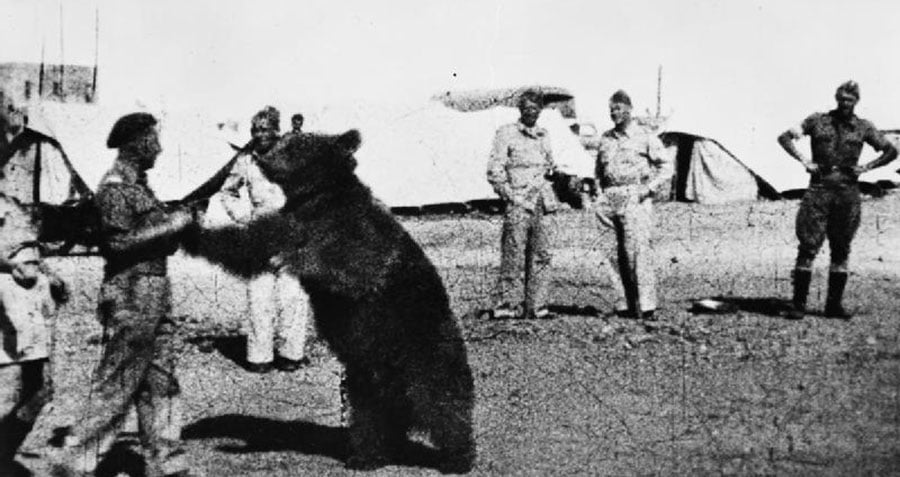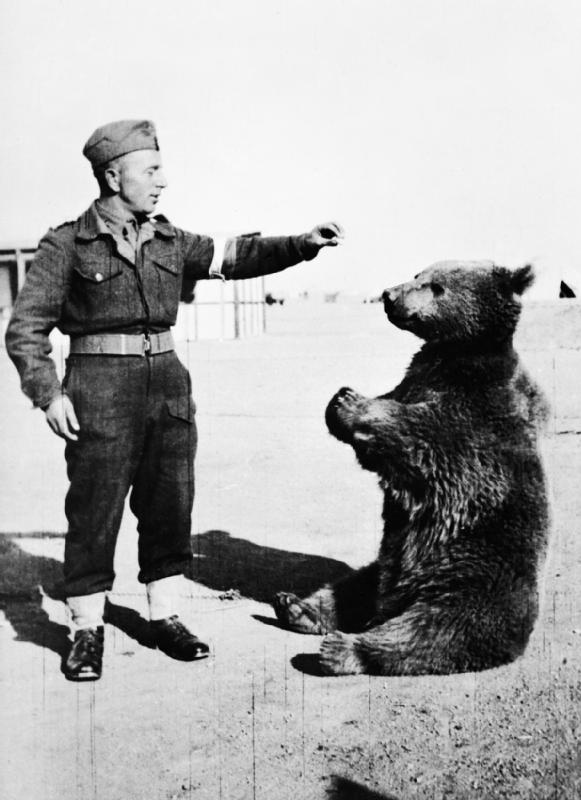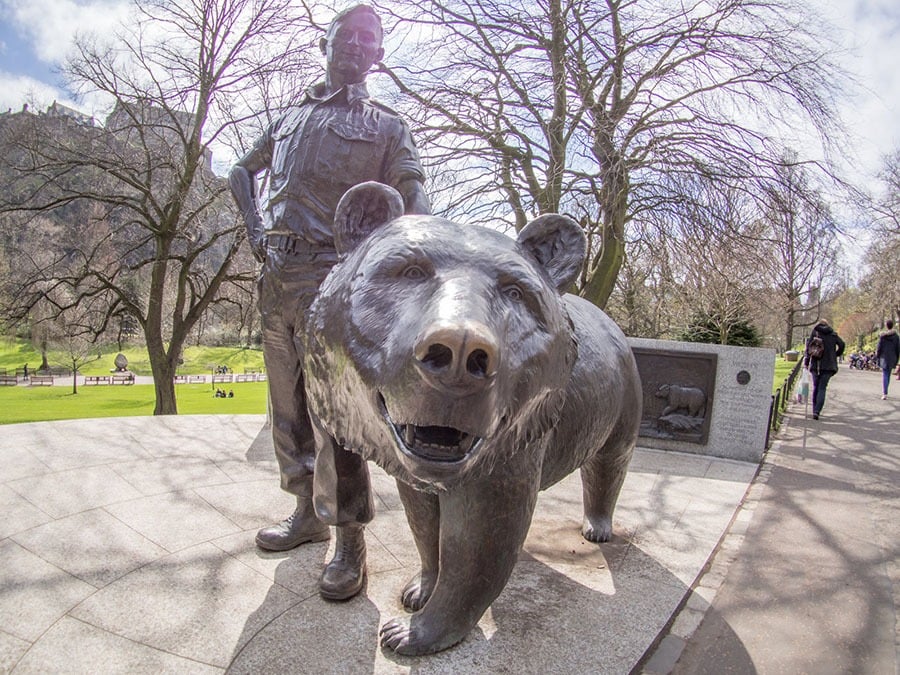Every semester in my Academic English class I have a speaking contest of some kind. One semester it might be "for 4 minutes talk about your favorite book", and the students are put in 4-5 student groups to battle out the "most interesting book" of the class. They start at small group level and then verbally battle it out in a second finalist round. This semester I thought we would have the speaking contest on "weirdest of the weird" news item, and again students had to "market their story" as the "weirdest of the weird" to win the prize. Much like the major leagues, the contest isn't just one-round of story-telling, but involves two before the students can choose the class pick for the weirdest story told to them. We had some amazing stories, but the most memorable story from the class was not the weirdest-of-the-weird,
"The Ear That Was Made with Van Gogh DNA", but the beer-drinking bear Wojtek of World War II who was a war hero! My history-buff student loves war stories so he scrounged for a stunner, and indeed, he won "most jaw-dropping" story in the class! Total consensus!
How an orphaned Syrian bear named Wojtek became a Polish army hero
 |
| Wikimedia Commons |
Troops of the Polish 22 Transport Artillery Company watch as one of their comrades play wrestles with Wojtek their mascot bear during the Middle Eastern campaign of World War Two, circa 1942-1943.
Amid a long journey to join forces with the British Army in World War Two, one unit of the Polish II Corps stumbled upon an unlikely, and invaluable, comrade: A Syrian brown bear.
A New Army And A New Mascot
Poland bore a bulk of World War Two-related traumas. After the Nazis invaded Poland on September 1, 1939 — only to be followed by the subsequent Soviet invasion on the 17th — the country had only experienced a couple of decades of independence before it found itself under occupation once again.
Following the invasions, Stalin and Hitler agreed to a nonaggression treaty, which effectively divided Poland in two. Hitler broke that pact on June 22, 1941, when he ordered an invasion of the USSR.
In what came to be known as the Sikorski-Mayski Agreement, Stalin declared all previous pacts between the USSR and Poland to be null and void. Among other things, this allowed Poles to create their own army, despite technically being on Soviet soil. That they did, and the army became the Polish II Corps led by Lieutenant General Władysław Anders.
In the spring of 1942, the newly-formed army left the USSR for Iran, along with the thousands of Polish civilians released from Soviet gulags. On the way to Tehran, the traveling Poles encountered an Iranian boy in the town of Hamadan who had found an orphaned bear cub. Irena Bokiewicz, one of the civilians, was so enamored with the cub that one of the lieutenants purchased him in exchange for a few tins of food.
The cub became a part of the 22nd Artillery Supply Company, and soon received its own Polish name, Wojtek (pronounced voy-tek), which translates to “joyous soldier.” Wojtek traveled with the company through the Middle East, as the unit made its way to join forces with the 3rd Carpathian Division of the British Army in Palestine.
Wojtek the Bear
 |
| Wikimedia Commons Wojtek sits with a Polish soldier, 1942 |
Growing up with soldiers, Wojtek adopted some rather curious habits. Indeed, reports say that the bear would drink milk from an old vodka bottle, imbibe beer and wine, and smoke (and eat) cigarettes with his army buddies, just as any soldier would.
Wojtek quickly became a source of light in the midst of war. He would often wrestle with his fellow fighters, and even learned to salute when greeted by his company men.
Wojtek’s fate with the company fell on uncertain times in 1943, when the unit prepared to board a ship and join the Allied campaign against Italy in Naples. Officials at the Alexandria, Egypt port refused to let the bear on as he was not officially part of the army.
In a quick, if not bizarre, workaround, soldiers made Wojtek a private of the Polish II Corps, and gave him a rank, service number, and pay book to legitimate his status. It worked, and Wojtek joined his comrades onto the Italy-bound vessel, this time as a legal member of the army.
By the time the unit arrived in Italy, Wojtek had grown significantly from cub to a 6 ft tall, 485 lb. adult Syrian brown bear. Making good use of his size and strength, the company taught Wojtek how to carry crates of mortar rounds, which he reportedly did without fail during the bloody battle of Monte Cassino.
Wojtek not only survived the conflict — soon after, he achieved legendary status. Indeed, following Wojtek’s valiant performance, Polish high command made Wojtek the official emblem of the 22nd Artillery Supply Company.
When the war came to a close in 1945, Wojtek retired from army life and traveled to Scotland with his fellow soldiers. Unlike his fellow veterans, Wojtek retired to the Edinburgh Zoo.
 |
| Wikimedia Commons |
While 21-year-old Wojtek would die at the zoo on December 2, 1963, his memories of army life would stay with him for the rest of his days. Reports say that the bear would perk up when he heard visitors speak Polish.
__________________________________________________________________
My student did further studies on the bear for relating his story. Once curious story he found was that initially the bear, as he was sitting up with his arms out, was given ammunition for a moment. When the bear didn't drop it but accepted holding the ammunition, the soldier or officer thought of getting the bear to actually carry ammunition to the front. Wojtek willingly did it! As Wojtek became even more loved in his company, the emblem patch on the uniforms of the Twenty-Second Artillery Supply in which Wojtek belonged came to be that of a bear ... carrying ammunition!
 |
Wojtek, the Bear of Monte Cassino
|
The "wartime
memoirs of Stanislaw Kroczak, an officer with the Twenty-Second Artillery Supply Company of the Polish II Corps ... [puts a lot of human-attributed behavior stories like carrying ammunition in his forepaws to the front] to rest but does note the bear’s role in helping maintain the troops’ high morale during the bloody campaign up the mountainous Italian peninsula, culminating in the capture of Monte Cassino by the Poles on May 18, 1944. After the war, Wojtek shared the lot of most of his Polish friends who chose not to return to their Soviet-dominated homeland. Many of them settled in Scotland, and Wojtek was placed in the Edinburgh Zoo, frequently visited by his old army buddies, journalists, and crowds of admiring fans. Wojtek died in Edinburgh in 1963, but his fame lives on in several Polish and English children’s books, a BBC film documentary, and commemorative plaques in the Edinburgh Zoo, Imperial War Museum in London, and the Canadian War Museum in Ottawa. His story is now also documented in the Hoover Archives." --
Hoover Institution, 21 March 2012



















